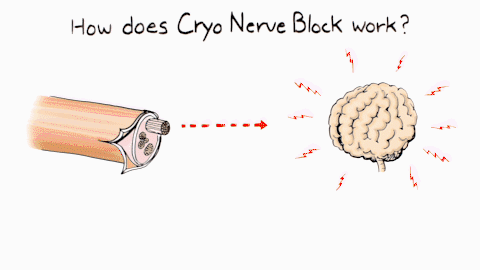
Cryo Nerve Block involves freezing the nerves located in your chest underneath each rib. These nerves are one of the main sources of pain after chest surgery, and cryo nerve block helps by temporarily shutting off the nerve. With Cryo Nerve Block you’ll have a sensation of numbness after surgery, which means a lot less pain.
How does Cryo Nerve Block work?
Your nerve has two main parts, an outer protective structure and the actual nerve that senses pain. By freezing the nerve at a specific temperature, it is disabled without damaging the protective structure. This allows it to regrow right back where it was before. Over several months, your nerve gradually regrows, about one to two millimeters per day or about the thickness of a credit card. The numbness will slowly go away and normal nerve feeling resumes starting from the side and going towards the sternum.
What type of procedures can Cryo Nerve Block be used for?
Cryo Nerve Block is most commonly used during surgical procedure involving the chest wall. These types of procedures include but are not limited to the following:
- Thoracotomy
- Lung surgery
- Pneumonectomy, Lobectomy, Wedge Resection, Segmentectomy
- Lung Transplant
- Pectus Excavatum Repair (Nuss Procedure)
- Rib Fracture Repair
- Esophagectomy
- Minimally invasive cardiac surgery
What are some of the other methods that may be available for pain management?
- Epidural analgesia
- Spinal anesthesia
- Intravenous/Oral pain medication
- Opioids/Narcotics
- NSAID
- Local anesthetic block
- Paravertebral block
What else do I need to know about Cryo Nerve Block?
AtriCure’s cryoICE cryoSPHERE cryoablation probes are sterile, single use devices intended for use in blocking pain by temporarily ablating peripheral nerves.
Potential procedural complications include, but are not limited to: Pneumothorax, Hypoalgesia, Hyperalgesia, Allodynia, and prolonged numbness greater than 3 months.
If you were to experience these symptoms, please contact your physician team and seek medical attention.
This information is not comprehensive. Talk to your health care provider to obtain the FDA-cleared product labeling or visit AtriCure.com.
Featured Story: Blake - Pectus Excavatum Patient
Part 1: Pre-Op
Part 2: One Week Pre-Op
Part 3: Surgery Day
Part 4: Post-Op
More Stories
Pectus/Nuss Patient
Thoracic/Lung Procedure Patient
Sternotomy/Cardiac Procedure Patient
Rx only

